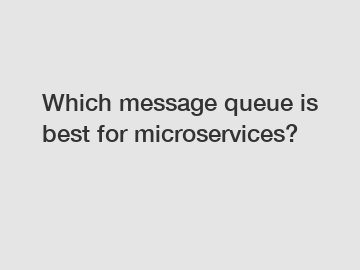Which message queue is best for microservices?
Which Message Queue is Best for Microservices?
Microservices architecture has gained significant popularity in recent years due to its ability to create complex applications by breaking them down into smaller, independent services. As these services communicate with each other, the need for a reliable and efficient messaging system becomes crucial. Message queues have emerged as the go-to solution for asynchronous communication between microservices. But with so many options available, which message queue is best for microservices? In this article, we will explore some popular message queues and evaluate their suitability for microservices.
RabbitMQ: A Reliable Option.

RabbitMQ is a widely-used open-source message broker that is known for its reliability and flexibility. It supports multiple messaging protocols, including AMQP, MQTT, and STOMP, making it compatible with various programming languages. RabbitMQ's rich feature set includes message acknowledgments, publisher confirms, and clustering capabilities, making it a robust choice for microservices.
Kafka: High Scalability and Performance.
Apache Kafka has gained immense popularity for its high scalability and performance, making it a popular choice for handling large amounts of data in real-time. It is designed to handle high-throughput, fault-tolerant messaging and offers features like replication, fault tolerance, and message retention. Kafka's unique publish-subscribe model makes it suitable for microservices that require real-time data streaming and processing.
ActiveMQ: Feature-Rich and Flexible.
Apache ActiveMQ is another widely-used open-source message broker that offers a rich set of features for building robust messaging applications. It supports a variety of communication protocols, including AMQP, MQTT, and STOMP. ActiveMQ provides features like message persistence, message expiry, and message filtering, making it suitable for microservices that require a flexible and feature-rich messaging solution.
NATS: Lightweight and Fast.
NATS is a lightweight and high-performance message queue that focuses on simplicity and speed. It delivers messages in a highly efficient manner and guarantees message delivery without sacrificing performance. NATS is an excellent choice for microservices that prioritize low-latency communication or require efficient messaging in resource-constrained environments.
Choosing the Right Message Queue for Your Microservices.
When selecting a message queue for your microservices architecture, there are several factors to consider:
1. Scalability: Evaluate whether the message queue can handle your expected message volume and scale with your application's growth.
2. Reliability: Consider the message queue's fault tolerance capabilities and whether it offers features like message acknowledgments and retries.
3. Compatibility: Ensure that the message queue supports the communication protocols and programming languages used in your microservices.
4. Performance: Look for queues that prioritize low-latency communication and offer high message throughput to meet the real-time requirements of your microservices.
5. Ease of Use: Evaluate the message queue's learning curve, documentation, and community support to ensure that it aligns with your team's expertise and resources.
In conclusion, the choice of message queue for microservices depends on various factors such as scalability, reliability, compatibility, performance, and ease of use. RabbitMQ, Kafka, ActiveMQ, and NATS are some popular options to consider, each with its unique features and strengths. It's crucial to thoroughly evaluate these options and select the message queue that best aligns with your microservices requirements. By choosing the right message queue, you can ensure seamless communication and efficient processing of messages within your microservices architecture.
If you need further assistance or have any questions about message queues for microservices, feel free to contact us. We are here to help!
Are you interested in learning more about Event Streaming System Supplier, message queue technologies, Event Stream System Blogs? Contact us today to secure an expert consultation!
202
0
0

Comments
All Comments (0)